► William Loney R.N. ► Documents ► Medical journals
William Loney’s Medical journal ADM 101/186 covers that part of the year 1872 in which he served as Staff Surgeon in HMS Glasgow, the flagship of the Commander-in-Chief on the East Indies station, Rear-Admiral James Horsford Cockburn. These are his case notes concerning the fatal sickness of this officer.
MEDICAL and SURGICAL JOURNAL of Her Majesty's Ship "Glasgow" between the 1 January and the 10 November 1872 during which time the said Ship has been employed in the East Indies
| Nature of Disease or Hurt | No. of Case | Men's Names, Ages, Qualities, Time when and where taken ill, the History, Symptoms, Treatment, and Daily Progress of the Disease or Hurt, and how disposed of. |
| Haemorrhoids | 1 | See below |
Rear Admiral J. H. Cockburn, aged 55. Came under treatment on the passage from Trincomalie to Calcutta in Jany 1872. Ill on board, 8 days, and at Government House, Calcutta, 3 weeks, or to the period of his death which is ascribed to "Dysenteric Colitis".
10 January. Visited the Admiral in his cabin today, with reference to the general state of the sick on board, when he referred to his own health. Complained of a vague general feeling of indisposition and sluggish bowels, I ordered a small dose of castor oil in emulsion and afterwards prepared a mixture of bicarbonate of potash & 
[1: Rx gentian] to be taken in state of effervescence, a favourite mixture of his, for which he had a prescription from a London physician.
11. Expressed himself benefited by treatment and dined in the wardroom today.
12. Visited him in his bed this morning and being informed by him that he has suffered from haemorrhoids for many years, I examined him and found one large protruding pile, much swollen, very sensitive and inclined to bleed. This was situated on the right side of the anus, while large folds of pendant skin occupied the opposite side, the remains of former haemorrhoids. Ordered a lotion of tannic acid and 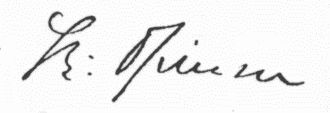
[2: Rx opium] and a sulphur electuary [a preparation in which the medicinal agent is beaten up with sugar, honey or molasses, to the consistency of a thick paste] and recommended him to remain in bed.
13 and 14. Symptoms unchanged & treatment continued.
15. Feels deepseated pain in the umbilical region this morning, and the tongue presents a light grey fur, with less relish for food. The haemorrhoids are unchanged.

[3: Rx Hyd(rargyrum) (mercury) cum (with) Cretan (chalk), 12 grains
Pulv (powder of) Ipecacuanha, 24 grains,
Morph Hydrochl (hydrochloride of morphia), 1 grain, ??? ???
Pulv (powder) 12. Caps 1 ter (in) die (1 capsule three times a day)
Continue lotion & use the ung(uentum) gallo & opii (gall - i.e. tannic acid - and opium ointment)]
16. Tongue more furred. Pain continues. Occasional scanty discharge from the bowels. Pulse continues good. Continue powders, lotion, & ointment, and apply warm fomentations [hot lotion] with 
[4: Sp(irit of) tereb(inthinae) (turpentine oil)] to abdomen.
17. Experienced temporary relief from the turpentine stupe [poultice]. Has been in the habit of wearing a belt over the abdomen and I order it to be continued. The relief experienced was only temporary for he now feels pain, - a dull deep seated pain - and the tongue presents a deeper and a darker fur, with some clamminess of mouth. Pulse good. Takes claret and water, but has very little relish for anything else. I had some chicken broth made, and ordered him to take a little. Treatment continued.
18. His friend, Mr Bethune, who is on a visit, looked out in the middle watch at my request, and I saw him at 4 this morning when he was induced to take the best part of a cup of chicken broth. Later he had a very copious evacuation from the bowels of a soft but perfectly natural character, and sometime afterwards another less copious stool.. Seeing this, and also some tendency to nausea, I omitted to give a powder until the evening. Ordered instead 
[5: 10 grains of ammon(ium) carb(onate)] in a state of effervescence with citric acid, 
[6: ter (in) die (three times a day)] - and desiring he should take as much chicken broth as he could. The pain was unremitting, and the tongue still deeply furred, but the pulse never flagged. About noon today he got up, dressed himself and moved into the after cabin, while his bed was being made, and Mr Bethune was packing up for him, preparatory to his going on shore at Calcutta. He still appeared to suffer from the abdominal pain, and in the course of an hour he felt cold and chilly, and retiring to bed had some warm claret which revived him. The act of getting up was unauthorised, & evidently done in view of the unavoidable move to Calcutta presently, which he would fain not make as an invalid, being keenly sensitive on the haemorrhoids question; and he expressed regret for having done so. I afterwards applied the turpentine stupe with relief to pain, and gave a powder at 10 o'C[lock], and later a citrate of ammonia draught in a state of effervescence with 
[7: ½ dram of the solution] of morphia.
19. Mr Bethune saw him take some nourishment before retiring to bed last night, and at 4 this morning I saw him sleeping tranquilly, & finding the wind blowing keenly through the ports on the port side, I shut up every place, leaving directions with the sentry to instruct the servant to give chicken broth when the Admiral awaked. At 7 o'C I gave him one of the following pills.
[8: Rx Pulv Ipecac (Ipecacuanha powder), Pulv Doveri (Dover's powder), a.a. (of each) 2 grains
Hyd(rargyrum) (mercury) cum (with) Cretan (chalk), 1 grain ??? F(ia)t pilula (make pills)]
He had a good night, but the pain continued in the abdomen generally, tenderness being felt on deep pressure in the umbilical and right iliac regions. Pulse good, & tongue deeply furred. At 10 o'C he sent for me to say that he had some nausea and vomiting, and that the vomiting was succeeded by profuse perspiration. Gave a citrate of ammonia draught and ordered that the perspiration should not be checked.
12 noon: Sleeping. Mr Bethune ready to encourage him to take refreshment.
3 o'C: Sent for me. He had had some refreshment, but the persistent pain worries and annoys him; the idea of taking a pill seemed to nauseate him, nevertheless he took one.
5 p.m.: Captain Jones returns from Calcutta and it is arranged that we go to Calcutta at 6 a.m. tomorrow.
6 p.m.: Sent for me. Very intolerant of the pain in the abdomen, explaining at the same time that it was not from its acuteness or severity. Gave him 
[9: ½ dram] of the solution of morphia in effervescing citrate of ammonia, and applied a turpentine stupe.
10 p.m.: Visited him again and gave another citrate of ammonia draught with 
[10: ½ dram] of the solution of morphia, and left him for the night.
20. - Saturday. 5 ½ a.m.: Find him sleeping. Waked up soon afterwards and arranged to prepare for the journey to Calcutta. He had had a turpentine stupe at 1 o'C applied by the sick-berth steward.
6½ o'C: The steamer alongside, removed from his cabin in a chair to her. Bore the journey to Calcutta very well. Slight nausea once or twice.
5 p.m.: reached place at Calcutta, where 2 of the Viceroys carriages were in attendance. Drive to Government House & soon afterwards I had a consultation with Dr Fayrer, Senior Surgeon of the College Hospital, and Dr [Oliver] Barnett, Surgeon to the Viceroy. They diagnosed thickening of the cecum and probable abscess in or near the part, but no ulceration, and they prescribed opium, assafoetida and 
[11: hyosciamus = Hyoscyamus (niger) (black henbane)] every 4 hours, and the turpentine fomentations to be continued.
From this time the Admiral was under the immediate care of Dr Fayrer only, as it was arranged that Dr Barnett should accompany the Viceroys party in a hired vessel, the "Dacca" to Rangoon, Moulmein, and the Andamans.
Copy of "Notes of His Excellency's, Rear Admiral Cockburns Case" - received from Dr Fayrer on the 17 February 1872, at Calcutta.
"His Excellency Rear Admiral Cockburn, Commander in Chief of her Majesty's naval forces in India, arrived at Calcutta from her Majesty's ship Glasgow at the Sand Heads, on the 20th January 1872, at about 6 p.m., in a very bad state of health. He was accompanied by Dr Loney, Staff Surgeon R.N. of H.M.S. Jones.
On the same day we held a consultation with Dr Barnett, Surgeon to his Excellency the Viceroy, in the Admirals case.
He appeared to be much depressed, but was free from fever. Complained of considerable suffering from haemorrhoids and from abdominal distention and pain.
On examination it was found that in addition to a considerable amount of tympanitis [i.e. the abdominal distention referred to, and not inflamation of the ear drum] there was induration [hardness] and severe pain on pressure about the cecum. The evacuations were few and scanty, and feculent [foul smelling]. The pulse was under 90, temperature normal.
Hot fomentations with turpentine were ordered to be applied to the abdomen, and an enema of tepid water with assafoetida to be administered.

[12: opium, 1 grain. Ex(tract of) hyosc(yamus), 2 grains, and assafoetida (Ferula assafoetida = "Devil's dung"), 1 grain]
were prescribed every 4 hours.
Under this treatment the Admiral improved considerably, and after the 4th day the quantity of opium was diminished. His appetite improved and he was well enough to walk about in the verandah, and later to go out for an evening drive.
His diet consisted of animal broths, arrowroot and sago, with a moderate quantity of wine.
In addition to the opium, carminatives were given, and with a view to obviate occasional perspirations, which were suggestive of malarious influences, quinine was ordered.
On the 29th he was not so well, the abdominal distention increased, and although the iliac pains had disappeared, there was general abdominal tenderness. Though the haemorrhoids had not given him any increased annoyance, he was exceedingly anxious for their removal, and urged the operation. Not considering any surgical interference prudent, I suggested that the matter be referred to consultation, and accordingly on the 30 January, Dr N. Chevers, Professor of Medicine and Senior Physician to the Medical College Hospitals met me in consultation. After a prolonged and careful enquiry, it was decided that an operation was not advisable in the Admirals present state.
His bowels about this time had become more irritable, and he had, during the 24 hours, several motions, which were entirely feculent and semisolid.

[13: Pulv Ipecac Co (compound extract of Ipecacuanha powder)] was prescribed, but he was unable to tolerate the nausea it induced, and as it was evidently doing no good, the opium was again substituted, with fomentations, sinapismes [mustard plasters] and opiate enemata, with benefit.
The improvement was of short duration however, for on the morning of the 3 Feb I found that he had passed a very restless night. His pulse had risen to 90, his tongue was dry and furred in the centre and his bowels had acted twice or thrice in the night.
On examining the evacuations as usual most carefully, and washing them, it was found that they were watery and sanguinolent, mixed with feculent matter of an offensive odor, and that there was a small dark-colored floculent slough of areolar tissue.
Regarding this as a very grave symptom I immediately requested the counsel of Professor N. Chevers, and that physician continued to see the Admiral with me daily, until the end.
I now add the daily notes of the Admiral's case.
Feb 2. Slept about three hours during the night; skin moist; pulse 84; tongue moist & furred; urine high colored; bowels not moved last night. This morning slight pain in the epigastrium. No appetite; no thirst.

[14: Quinine sulph(ate), 1 grain
Opium, 1 grain] with fomentations & poultice were ordered.

[15: Ol(eum) Ricini (castor oil), 6 drams. Rx Card(amon) Co(mpound) (alcoholic extract of cardamon seeds), ½ dram
Rx Rhei ((extract of?) rhubarb), 1 dram. Aqua M(enthae) P(iperitae) (peppermint water) ???]
was given at 12 noon.

[16: Liq(uor) Opii Sedativus (Battley's sedative opium liquor), 30 grains
Mucil(age of) Accacio, 2 drams ???] for

[17: ingection = ingestion?].

[18: Liq(uor) Plumbi diacetati (lead diacetate solution), 2 drams
Rx: Opii (opium), 1 ounce; warm water, 8 ounces ???] for fomenting the piles.
5.30 p.m.: pulse 80; tongue the same as this morning; bowels not moved by oil. Vomited once at 6 p.m., some bile. Feels dull pain in the epigastrium.

[19: Calomel, 5 grains
Ex Col Co (Compound extract (= alcoholic extract) of Colchicum autumnale = meadow saffron), 3 grains ???] at bed time.
Fomentations, poultices, and ingections to be continued.
Feb 3. Restless night, passed a small slough about the size of 8 annas piece; tongue furred dry, abdomen distended. Fluid but feculent motion, faintly tinged with blood; pulse 90.
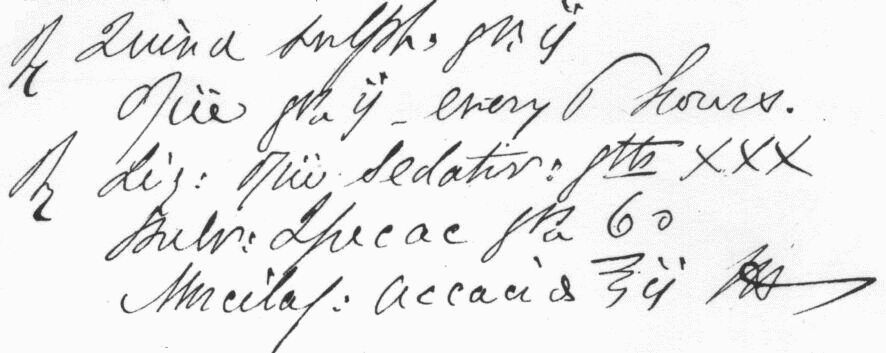
[20: Rx Quinine sulph(ate), 2 grains
Opium, 2 grains every 6 hours
Rx Liq(uor) Opii Sedativ(us), 30 grains
Pulv Ipecac, 6 grains ???
Mucilage Accacias, 2 ounces ???] for ingection.
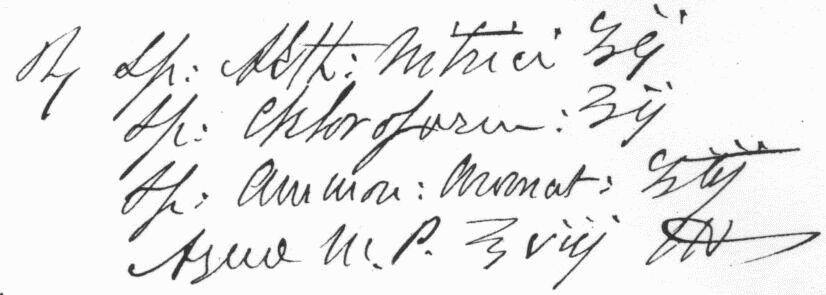
[21: Rx Sp(iritum) Aeth Nitrici (alcoholic solution of nitric ether = ethyl nitrate), 2 drams
Sp Chloroformum, 2 drams
Sp(iritum) Ammon(ium) Aromat(icum) (spirits of aromatic ammonia; ammonium carbonate dissolved in ammonia water and water and added to an alcoholic solution of the oils of lemon, nutmeg, and lavender flowers), 3 minims
Aqua M(enthae) P(iperitae) (peppermint water), 8 ounces ???] one table spoonful when necessary.
Restless day; bowels not moved during the day; vomited once. A little bile as in the morning. Pulse 94; tongue dry and furred; pain in the epigastrium again.
Feb 4. Two stools in the night; similar to those of yesterday, but containing a shred or two of mucus. Pulse 100; countenance depressed and anxious. Was sick during the night. Ejected a small quantity of bile.

[22: Opium, 1 grain
Ex(tract of) Hyosciama, 2 grains ???] every 4 hours.


[23: Sp Aeth Nitr, Sp Chlorof(mum) and Sp Ammon(ium) arom(aticum) (spirits of nitric ether, chloroform and aromatic ammonium)] with cinnamon water occasionally.

[24: Emp(lastra) Sinapi (mustard plasters)] and opiate enematas were continued.
5.30 p.m. Pulse 98, he feels rather better. Bowels moved once, about 4 p.m. Felt in the afternoon a severe pain in the lower abdomen. No vomiting.
Feb 5. Pulse 108; a restless night. Tongue dry; slight wandering. Complained of tympanitic distention; bowels acted once, feculent and musous. One largish clot, with a portion of mucous membrane adherent. Fluid stool tinged with blood.
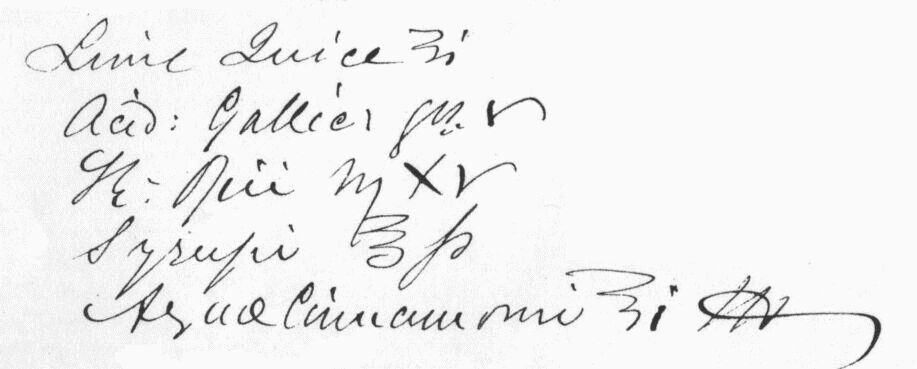
[25: Lime juice, 1 dram
Acid Gallicum (gallic acid), 5 grains
Rx: Opii (opium), 15 minims
Syrupi, ½ ounce
Aqua cinnamomi (cinnamon water), 1 ounce ???] every four to six hours.
Enemata continued.
6 p.m. Pulse 102; bowels acted once; passed two pieces of slough at 4 p.m. and vomited once. Abdomen tender on pressure; tongue dry.
Feb 6. Tongue dry in centre and pulse 116. Abdomen still tympanitic, tender on pressure in right hypochondriac region. Slept at intervals. Several motions after the enema. Some minute cellular sloughs, and a portion of 
[26: purple(?) mucus] passed. He does not seem weaker this morning. Fluid part of stool, partly enema, slightly tinged with blood. No gangrenous odor. Medicines were all continued.
5 p.m. pulse 116; bowels moved once; there was a very small slough; tongue dry.
Enema continued.
Feb 7. Passed a restless night. One motion, feculent, watery, bloodstained, and containing a clot about as big as a shilling and more fetid than usual. Pulse 114 to 120. Tongue dry, coated in the centre. Looks more depressed. Abdominal tenderness and tympanitis the same. Continued mixture and enematas.
9 a.m. Has had a loose motion with a few hardened lumps of the size of peas of feculent matter floating on the surface. No appearance of blood or sloughs.
Poultice was omitted and spongiopiline [wool or cloth felted together with small pieces of sponge, having an impermiable back, used as alternative for poultice] applied.
12 noon. Pulse 120; temperature 96.6; respn 22.
1.30 p.m. Has had another very offensive motion of the same character, but smaller in quantity, and containing a few dark colored coagulas of blood, and two shreds of mucus.
3.30 p.m. Another motion containing coagulated blood and slough. Pulse 120 to 124.
9.30 p.m.Tried the bedpan, passed nothing but flatus.
10.15 p.m. Made an effort to get up to stool, but was persuaded to use the bedpan. Passed a large quantity of flatus, and about two ounces of loose feculent matter with minute clots of blood.
Feb 8. Pulse 118 to 120; tongue dry; not coated in the centre. Great tenderness in the transverse colon, the remainder of the abdomen less tender. One motion, some formed feculent matter. A small clot or two, and more minute sloughs. If any change he is rather better. Slept at intervals.
Continue mixture and ingections [?], and mustard poultice.
1 p.m. Troubled with hiccup more or less persistent, at intervals of about an hour, induced apparently by every effort to take nourishment. Pulse 126 to 130; temperature 95.5; respn 23.
2.30 p.m. One motion. About an ounce of loose feculent matter, free from blood & slough.
3.15 p.m. Hiccup returned and continued ten minutes.

[27: Sp(iritus) Aeth(er) Sulph(ur), 20 minims
Aqua M(enthae) P(iperitae) (peppermint water), 1 ounce ???] Four doses.
Two mustard plasters.
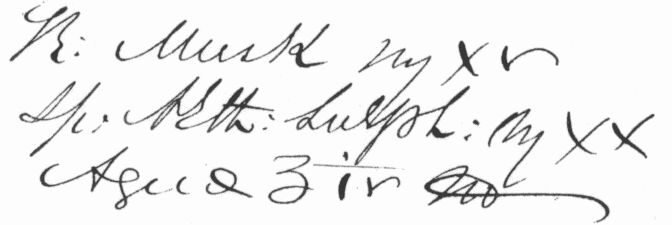
[28: Liq: Musk, 15 minims
Sp Aeth Sulph, 20 minims
Aqua, 4 drams ???] for hiccup.
Bran fomentations.
Feb. 9 Weaker this morning. Pulse 120. Passed four feculent, one large, more solid motion last night. Apparently no sloughs, but a small clot. Countenance and voice more depressed. Hiccup troublesome.
Feb. 10 8.30 a.m. much weaker. Almost collapsed. Pulse 130 to 140. Has passed some slight sanguinolent motions. Is still able to take food and is conscious but tends to wander. Tympanitis increased but no pain. Hiccup less frequent, checked by musk & ethers.
3.30 p.m. Had two large feculent motions mixed with fragments of sloughs and clots. Became suddenly much weaker and is now dying.
Collapsed and pulseless. Stimulants had been given. He had slight involuntary [word(s) missing: discharge?] of grumous looking matter since the morning.
There was no post mortem examination as the cause of death was obvious.
(signed) J. Fayrer M.D.
Calcutta, 14 Feb '72
Note: In Dr Fayrer's report of the case to the Government of India, a copy of which I have before me, "Dysenteric colitis" is given as the cause of death.
Top↑
 |